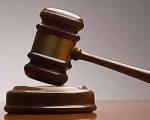In the Prosecutor’s Line of Fire

With the Deputy Prosecutor General seeking the dismissal of a Kyiv judge guilty of a number of acquittals, you might wonder if the latter had ignored conclusive evidence and set serial killers at large. Not in Ukraine where the Prosecutor regularly goes on the offensive when judges have the temerity to find the prosecution’s case unconvincing. Since Ukraine’s acquittal rate has fallen to below one percent, such methods are clearly having the desired effect, with judges preferring not to ask too many questions.
At the latest session of the High Council of Justice on Oct. 22, Judge S. Nozdryakov stood his ground. He possibly had little to lose by now after two years under siege. His 5-year- initial term has ended but the “check” initiated after he aroused the Prosecutor’s wrath is stopping parliament from voting for his indefinite tenure. At the meeting Nozdryakov defended his rulings and said that he would make them again. Accused of having unwarrantedly released a defendant from custody back in 2010, he pointed out that if he hadn’t, the man who is facing charges of taking a bribe would now be spending a fourth year in detention with the court proceedings still ongoing.
With respect to a case where he acquitted the person, he asked: “what is the court to do: let itself be led on a leash by the Prosecutor or hand down an innocent verdict?”
The Prosecutor’s answer to this has unfortunately long been clear and since Yanukovych’s “judicial reform” in July 2010, pressure on judges to conform has only increased. Deputy Prosecutor General and member of the High Council of Justice, Mykhailo Havrylyuk has been on the warpath for a long time and his complaints that the Kyiv judge had issued “unlawful” court rulings are nothing new. In June 2011 he proposed that the High Council of Justice dismiss three judges of the Kyiv Court of Appeal for releasing a person from custody. The judges’ decision had been in full compliance with Ukraine’s Constitution and European Court of Human Rights case law. In November 2011 both Havrylyuk and the then First Deputy Prosecutor General Renat Kuzmin tried to get judges of the Supreme Court dismissed for alleged “breach of oath”. This vague term has been severely criticized by the Venice Commission as giving wide scope for abuse. In November 2011 it was widely believed that the actions against Supreme Court judges were part of concentrated measures, included politically motivated detention, aimed at removing the then President of the Court, Onopenko and bringing this last bastion of judicial independence under control (see Supreme Orchestration). Havrylyuk received one of the Ukrainian Helsinki Human Rights Union’s 2011 Thistle of the Year worst human rights offenders anti-awards for his pressure on judges and contempt for the justice system
Writing of the session of the High Council of Justice on Oct. 22, Hryhory Abramov notes that it highlighted a longstanding problem: the prosecutor’s office uses all available means to put pressure on judges and on the rulings they issue. Judges know that they can expect trouble if they disagree with the prosecution’s view of the situation and all too often go along with this.
Despite certain improvements since the introduction of the new Criminal Procedure Code, there is little evidence that the police have stopped using torture and other illegal methods of influence to extract confessions and other testimony. These methods mean that investigators can provide statistical indicators for the number of crimes “solved” without necessarily meaning that the actual perpetrators of the crimes have been caught. The prosecutor who, according to Ukrainian legislation is supposed to oversee police observance of the law and human rights requirements effectively works closely with the investigators with the priority being on obtaining a conviction. If judges are then threatened and intimidated and avoid passing sentences which will be appealed by the Prosecutor and also cause them difficulties, the ramifications for justice are grave.





